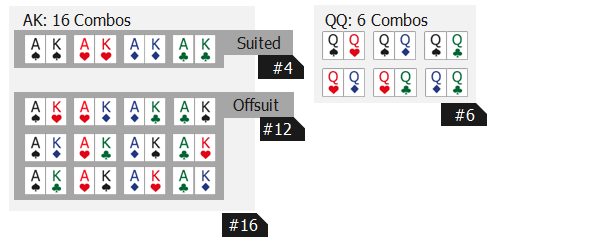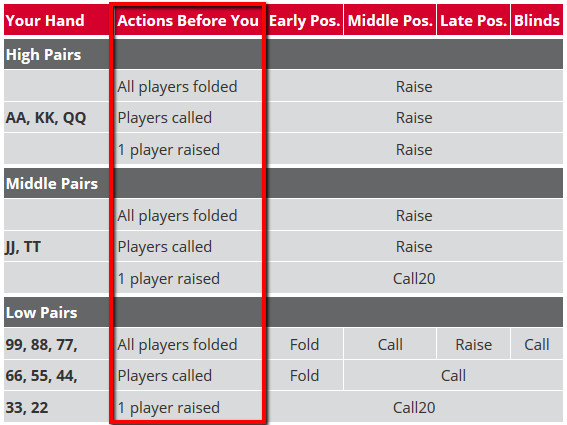
Print out this free poker hand rankings chart – and always know the best winning poker hands. Poker hands are ranked in order from best to worst. Royal Flush An ace high straight flush. Straight Flush Five consecutive cards in the same suit. Four of a Kind Four cards of the same rank. For a great training video on poker combinatorics, check out this poker combos video. 'Combinatorics' is a big word for something that isn’t all that difficult to understand. In this article, I will go through the basics of working out hand combinations or 'combos' in poker.
Most Commonly Asked Poker Questions
Not sure what beats a full house or what a straight can beat? Here are the answers to the most commonly-asked poker questions this side of the Strip.
Does a flush beat a full house?
No. A full house beats a flush in the standard poker hand rankings. The odds against making a full house in a game of Texas Hold’em are about 36-to-1, while the odds against making a flush are 32-to-1. The full house is a more rare hand and beats a flush.
Does a flush beat a straight?
Yes. Using the standard poker hand rankings, a flush beats a straight, regardless of the strength of the straight. The odds against making a straight in Texas Hold’em are about 21-to-1, making it a more common hand than a flush (32-to-1 odds against).
Does a straight beat a full house?
No. The odds against making a full house in Texas Hold’em are about 36-to-1, while the odds against making a straight are about 21-to-1. Both are strong five-card hands, but a full house occurs less often than a straight. A full house beats a straight in the poker hand rankings.
Does three of a kind beat two pair?

Yes. Both three of a kind and two pair can make a lot of money in poker, but three of a kind is the best hand when it goes head to head with two pair. The odds against making three of a kind in Texas Hold’em is about 20-to-1, while the odds against making two pair is about 3-to-1.
Does three of a kind beat a straight?
No. The odds of making both of these hands are very close in a game of Texas Hold’em. The odds against making a straight are 20.6-to-1, while the odds against making three of a kind are 19.7-to-1. The straight comes about slightly less often, making it the winner against three of a kind in the poker hand rankings.
Does a flush beat three of a kind?
Yes. The battle of strong hands between a flush and three of a kind sees the flush as the stronger hand. The odds against making a flush in Texas Hold’em are about 32-to-1, with odds against making three of a kind at around 20-to-1.
Does a straight beat two pair?
Yes. The poker hand rankings dictate that a straight is a stronger hand than two pair. The straight occurs with about 21-to-1 odds against in Texas Hold’em, while the odds against making two pair stand at about 3-to-1.

Does four of a kind beat a full house?
Yes. Both four of a kind and a full house are among the strongest poker hands, but four of a kind is a much rarer holding. Texas Hold’em odds against making four of a kind are 594-to-1, while you have about 36-to-1 odds against making a full house.

Does three of a kind beat a flush?
No. When the flush and three of a kind go head to head, the flush comes out as the best according to the poker hand rankings. The odds against making three of a kind sit around 20-to-1, with the odds against hitting a flush at 32-to-1.
Does a full house beat a straight in poker?
Yes. The full house comes in less often than a straight. In Texas Hold’em, the odds against drawing a full house are around 36-to-1, while the odds against making a straight are around 21-to-1.
Does a straight flush beat four of a kind?
All Poker Card Combinations

Combination In Poker
Yes. Four of a kind is an exceedingly rare hand in poker, but the straight flush is an even more elusive five-card hand. The odds against making a straight flush in Texas Hold’em is about 3,590-to-1, much rarer than four of a kind (594-to-1 odds against)